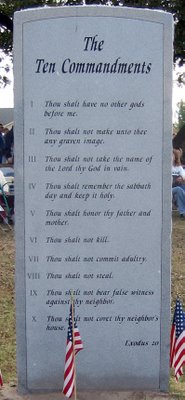Dr. Jeffress,
You posted on Bruce Prescott's blog that it had yet to be demonstrated that you had made a substantive error in your claims that America is a 'Christian nation' and that the Supreme Court declared that Christianity was the 'established religion.'
Here is that demonstration of factual and interpretive error.
The Supreme Court decision Church of Holy Trinity v. United States (1892) was not a church-state decision. The issue was neither to decide nor to declare whether the America was a 'Christian nation.'
Like many advocates of the claim that America is a 'Christian nation' you fail to distinguish between two senses of 'Christian nation':
1. the institutional -- legal sense, in which the laws and political institutions have Christianity as their doctrinal-philosophical foundation.Josiah David Brewer's majority decision makes it quite clear that he held that America was a Christian nation in the second sense, not the first,
2. the historical -- cultural sense, in which the American people and their cultural-social institutions are predominately influenced by Christianity.
"This is a religious people. This is historically true. From the discovery of the continent to the present hour, there is a single voice making this affirmation. We find everywhere a clear recognition of the same truth . . . These, and many other matters which might be noticed, add a volume of unofficial declarations to the mass of organic utterances that this is a Christian nation." [emphases added]Brewer later wrote a book entitled The United States: A Christian Nation (1905) in which he made clear his view:
"But in what sense can the United States be called a Christian nation? Not in the sense that Christianity is the established religion or that people are compelled to support it. . . . Nor is it Christian in the sense that a profession of Christianity is a condition for holding office or otherwise engaging in public service, or essential to recognition either politically or socially. In fact, the government as a legal institution is independent of all religions." [emphases added]Brewer's words are a part of the 'dicta,' providing the rationale of the decision. They were not a part of the 'findings' of the decision. Even if Brewer were asserting that America is a Christian nation in a legal-political sense, and he was not, dicta establish no precedent and establish no principle of law.
Nowhere in the decision is the term 'established' used to describe the relation of the Christian religion to the legal-political institutions of American government.
Beware of basing your case upon a corrupted text of the decisions that is widely disseminated among those who advocate your position. (The following words in italics are spurious -- they are not contained in the Holy Trinity decision.)
"Our laws and institutions must necessarily be based upon and embody the teachings of the Redeemer of mankind. It is impossible that it should be otherwise. And in this sense to the extent that our civilization and institutions are emphatically Christian . . . This is a religious people. This is historically true. From the discovery of the continent to the present hour, there is a single voice making this affirmation. We find everywhere a clear recognition of the same truth . . . These, and many other matters which might be noticed, add a volume of unofficial declarations to the mass of organic utterances that this is a Christian nation."I will look forward to your acknowledgment that factual and interpretive errors in your case have now been demonstrated.
You can demonstrate your integrity by acknowledging this on Prescott's blog comments section.
Sincerely,
Mark Weldon Whitten

